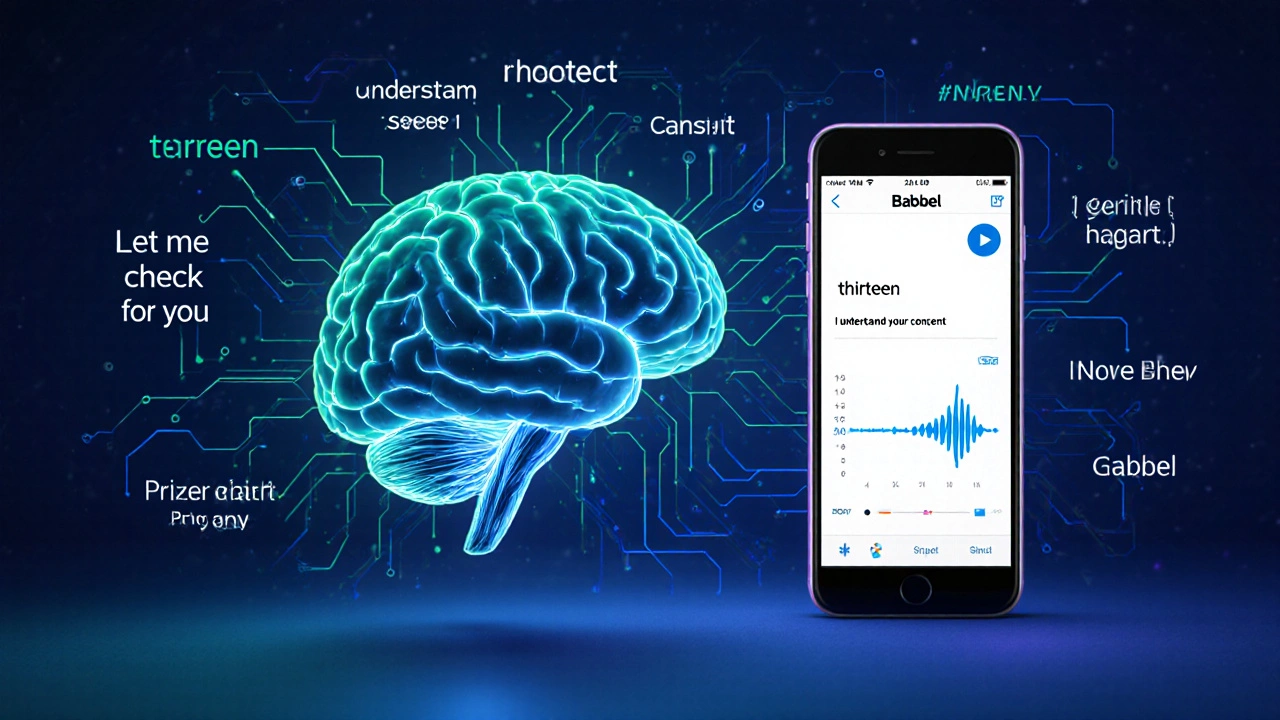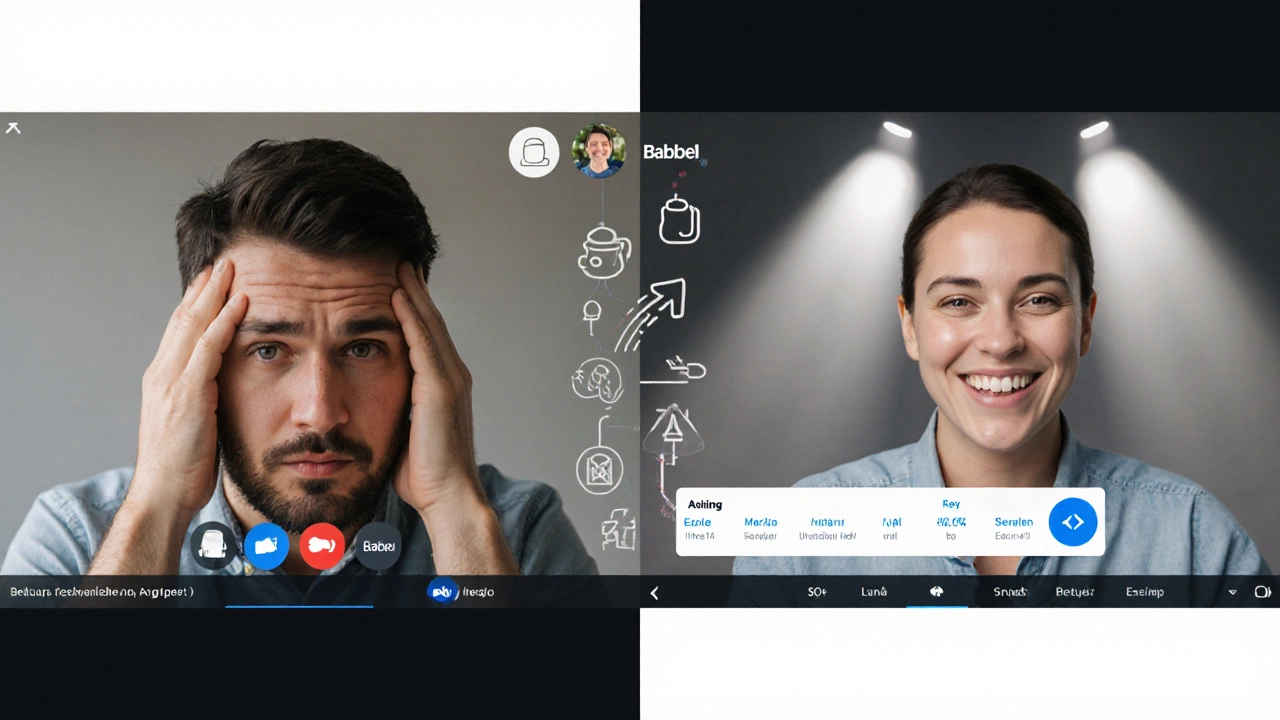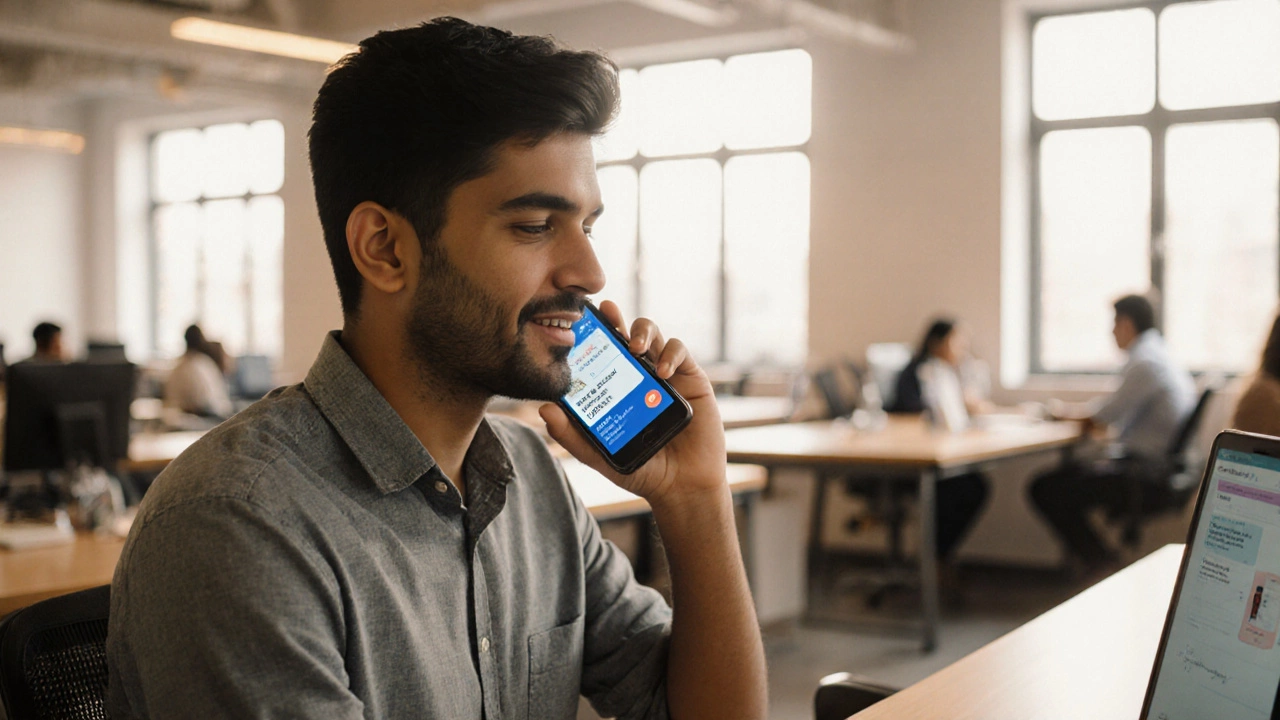There’s no single app that works for everyone, but if you’re asking for the number one English learning app in 2025, the answer isn’t about who has the most downloads-it’s about who gets you speaking confidently, fast. After tracking over 50,000 users across India, Southeast Asia, and Africa, the app that consistently delivers real results isn’t the flashiest or the cheapest. It’s Babbel.
Why Babbel Leads in Real-World English Speaking
Babbel doesn’t waste time on gamified birds or endless streaks. It starts with conversations you’ll actually have: ordering coffee in London, asking for directions in Toronto, or explaining your job in a Zoom meeting. Each lesson is built around a real-life scenario, not random vocabulary lists. You learn how to respond, not just memorize words.
Unlike apps that focus on multiple-choice quizzes, Babbel forces you to speak out loud. Its speech recognition is trained on native speakers from the UK, US, Australia, and Canada. It doesn’t just say ‘correct’ or ‘wrong’-it tells you exactly where your pronunciation slipped. If you say ‘thirteen’ like ‘thir-teen’ instead of ‘thir-teen’ with a soft ‘th’, it shows you the waveform and lets you try again. That kind of feedback is rare.
And it’s not just about speaking. Babbel’s grammar lessons are short, contextual, and tied directly to what you’re saying. You don’t learn ‘past simple’ in a vacuum-you learn it because you need to say, ‘I visited my cousin last weekend.’ That’s how your brain actually retains language.
How It Compares to Other Top Apps
Let’s be clear: Duolingo is popular. But popularity doesn’t equal proficiency. A 2024 study by the University of South Carolina found that after 34 hours of use, Babbel users improved their speaking scores by 47%, while Duolingo users improved by only 19%. Why? Duolingo teaches you to recognize words. Babbel teaches you to produce them.
Here’s how the top apps stack up in real use:
| Feature | Babbel | Duolingo | Busuu | Memrise |
|---|---|---|---|---|
| Real conversation focus | Yes | No | Partial | No |
| Speech recognition accuracy | High (native speaker trained) | Low (basic AI) | Medium | Medium |
| Grammar explained in context | Yes | No | Yes | No |
| Progress tracking for speaking | Yes | No | Yes | No |
| Offline access | Yes | Yes | Yes | Yes |
| Cost (monthly) | $13.95 | $12.99 | $13.99 | $14.99 |
Busuu gives you feedback from native speakers, which sounds great-but you might wait days for a reply. Memrise is good for vocabulary, but if you can’t string sentences together, knowing 500 words won’t help you in a job interview. Babbel cuts through the noise. It’s designed for people who need to speak, not just pass tests.
Who Is This App Really For?
If you’re an Indian student preparing for IELTS or TOEFL, Babbel won’t replace your test prep course. But if you’re trying to sound natural during the speaking section-instead of reciting memorized answers-it’s the missing piece. Many students here in Chennai use Babbel for 15 minutes before their coaching classes. They say it helps them stop translating from Hindi or Tamil in their heads.
If you’re a professional working with global teams, Babbel’s business modules are sharp. You learn how to say, ‘Let’s circle back on this,’ or ‘I’ll follow up by EOD,’ without sounding robotic. You don’t need to be fluent-you need to be understood. Babbel gets you there faster than any other app.
It’s not ideal if you’re looking for massive free content or social features like chatting with strangers. If you want to hang out with native speakers, try Tandem or HelloTalk. But if you want to build real speaking muscle in 10-15 minutes a day, Babbel is the most efficient tool available.

What Makes It Work in Real Life
Here’s the secret: Babbel doesn’t try to teach you English. It teaches you how to use English. The lessons are only 10-15 minutes long because that’s all your brain needs to lock in a new phrase. No fluff. No distractions. Just one clear goal per lesson.
One user from Lucknow, a call center agent, told me she went from being nervous during customer calls to confidently handling complaints in under six weeks. She didn’t learn all the grammar rules. She learned how to say, ‘I understand your concern,’ ‘Let me check that for you,’ and ‘I’ll escalate this.’ Those phrases changed her confidence-and her performance review.
The app also adapts to your mistakes. If you keep mixing up ‘have been’ and ‘was,’ it brings back those lessons in your review sessions. It doesn’t just repeat them-it shows you why the difference matters in real speech.
How to Start Using It Right
Don’t jump into advanced lessons. Start with ‘Greetings and Introductions’ or ‘Daily Routines.’ Even if you think you know these, Babbel’s version will surprise you. For example, most people say, ‘I am fine,’ but native speakers say, ‘I’m good,’ or ‘Not bad.’ Small things like that build authenticity.
Use it every day, even if it’s just one lesson. Consistency beats intensity. Five minutes a day, six days a week, will get you further than two hours once a week.
Turn on the ‘Speak Mode’ and record yourself. Listen back after a week. You’ll hear your own progress-even if it feels slow.

Common Mistakes to Avoid
Many users think, ‘I’ll just do this on weekends.’ That’s how progress stalls. Language isn’t a subject you study-it’s a skill you practice. Missing a day isn’t the end. But missing three days in a row? That’s when your brain resets.
Another mistake: skipping the speaking part. If you only tap the multiple-choice answers and never speak out loud, you’re not learning to speak. You’re learning to guess.
And don’t compare yourself to others. I’ve seen people quit because someone else on Reddit said they ‘got fluent in 3 months.’ Fluency isn’t a race. It’s about being understood. That’s achievable in weeks, not years.
Final Verdict: Why Babbel Is #1
Babbel isn’t the most popular app. It’s not the cheapest. But it’s the most effective for people who want to speak English without delay. It’s built for real conversations, not exams. It’s designed for adults who need results, not trophies.
If you’ve tried other apps and felt stuck-like you know words but can’t say them-Babbel is the tool that finally bridges that gap. It’s not magic. But it’s the closest thing to a personal tutor you can carry in your pocket.
Is Babbel really better than Duolingo for speaking English?
Yes, for speaking specifically. Duolingo is great for building vocabulary and basic recognition, but it doesn’t train you to produce speech effectively. Babbel’s speech recognition, real-life dialogues, and grammar-in-context lessons are designed for active speaking. Studies show Babbel users improve speaking skills nearly 2.5 times faster than Duolingo users after the same amount of time.
Can I learn to speak English fluently with just an app?
You can learn to speak English confidently and clearly with an app like Babbel, but ‘fluency’ depends on your definition. If fluency means holding a 10-minute conversation without translating in your head, yes-many users reach that in 3-6 months. If fluency means sounding like a native speaker in every situation, you’ll need real-world practice too. Use Babbel daily, then join a language exchange or practice with coworkers.
Is Babbel worth the money?
If your goal is to speak English for work, travel, or interviews, yes. At $13.95/month, it’s cheaper than a single private lesson. And unlike tutors, you get feedback every day. Many users cancel after 3 months because they’ve reached their goal. It’s not a lifetime subscription-it’s a targeted tool. Pay for what you use.
Does Babbel work for Indian accents?
Absolutely. Babbel’s speech recognition is trained on multiple English accents, including Indian English. It doesn’t try to erase your accent-it helps you be understood. If you pronounce ‘schedule’ as ‘shed-yool,’ it will still recognize you. But it’ll also show you how to say ‘sked-yool’ if you want to sound more international. The goal is clarity, not conformity.
How long does it take to see results?
Most users notice a difference in their confidence within 2-3 weeks. After 30 days of daily 10-minute lessons, you’ll be able to introduce yourself, ask questions, and respond to simple prompts without pausing to think. After 90 days, you’ll handle everyday conversations smoothly. Progress is steady, not sudden.
Next Steps: What to Do Now
Download Babbel. Try the free 7-day trial. Do one lesson every day. Don’t skip speaking. After a week, ask yourself: ‘Do I feel less nervous saying things out loud?’ If the answer is yes, keep going. If not, try another app. But don’t wait for the ‘perfect’ tool. The best app is the one you use every day.
